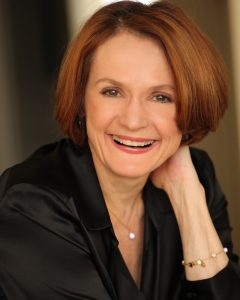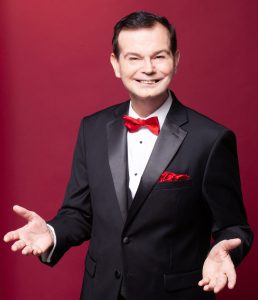Meet Four Performers Who Faced A Different Kind of Challenge, and Triumphed!

ANITA HOLLANDER, whose double bout with cancer led to a full leg amputation, has no problem with the words “disability.” The preferred term today is “challenge,” she knows and understands those who choose it, especially if they can “pass” and enjoy more casting opportunities. But Hollander favors “disability” as an expression of identification, pride, and political strength. The national chair of SAG-AFTRA Performers with Disabilities Committee and a member of the Actors Equity/Broadway League Diversity Coalition, Hollander is a committed activist and advocate. She also embraces the comic elements of “disability,” and loves playing the provocateur on stage.
In her autobiographical solo shows, Spectacular Falls and Still Standing, she matter-of-factly recounts her journey; in the latter she unhinges her prosthetic leg, hurling it over her shoulder and then joyously hobbles around the stage. The hardware is cumbersome, she points out, swinging her body atop a piano and bursting into song. Yes, there’s an element of the grotesque, but it quickly wears off. The viewer’s initial shock and sense of voyeurism are replaced with acceptance.
Hollander’s first cancer diagnoses—it’s a rare nerve tumor (neurofibrosarcoma)—took place in 1977 when she was a student at Carnegie Mellon. Surgery, chemo, and radiation followed, though she had not yet lost her leg. When the tumor returned five years later her leg needed to be amputated. Prior to that time she was a go-to cabaret performer (also a working actor) who performed in major cabarets and opened for such stars as Robin Williams and Rodney Dangerfield. Her specialties were pop songs and those pieces right out of the American Songbook. It was an epiphany when an acting teacher suggested she rethink her repertoire to present her story.
It was a new creative experience and took her down an unexpected path. As she wrote her story she also began forging her own songs. An unanticipated benefit is that “it gave me the opportunity to play with my vocal range in a whole new way,” Hollander recalls. In addition, she tracked down songs by other writers that were not necessarily familiar, but told interesting stories. She grew musically and as an actor.
“Before my diagnosis I was musically adept,” she recalls. “I worked hard on the musical elements. After cancer, I had a depth of understanding and found myself digging deeper in my music, storytelling, and performances.”
Watch Hollander perform the opening number in her one-woman show, Still Standing:
***
Like Hollander, the three other cabaret performers I interviewed, all of whom have faced inordinate challenges (they prefer the word “challenges”), have little doubt they were forced to reinvent themselves and, in the process, their artistry deepened, so, too, their connections with their audiences.

Consider CLAUDINE CASSAN-JELLISON, a charismatic performer and storyteller; she is the whole package who was celebrated for her three octave range sung with perfect pitch. She performed ballads, held long notes, and could belt out a song.
Suddenly five years ago her vocal coach noticed that her singing was flat. She never sang flat and did not hear it when he pointed it out. But the problem persisted. She consulted doctors who were dismissive. The first physician suggested she drink a glass of wine before performing. She knew that that was terrible advice, despaired and blamed herself for what was happening to her voice. Her voice teacher David Sabella insisted she was doing nothing wrong and sent her to the Sean Parker Institute for the Voice/Weill Cornell Medicine for further evaluation.
That’s when she was diagnosed with “an essential vocal tremor,” she says. “It is a neurological disease, not Parkinson’s, but like it. It affects the vocal cords and I struggle to keep my tongue, specifically the base of my tongue from shaking. Early on I thought I could just revise my shows a little bit. I was managing.”
But Cassan-Jellison knew hers was a progressive, disheartening disease that could ultimately impact her speech as well. To date, her condition has not significantly worsened but she soon realized she could not go back to her old style of singing. She had to use her singing voice in a whole new way, employ the lighter part of her voice and sing on the consonants. Cassan-Jellison was taught to make a crisper sound as opposed to relying on air flow or singing on vowels. She had to depend far more on her speaking voice in song.
For the first time Cassan-Jellison found herself focused on the acting and lyrics rather than the music or “listening to myself sing,” she recalls. During the height of the COVID crisis she continued to work online with Sabella, musical director David Gaines, and in person with voice teacher Mike Ruckles, doing shorter songs, character songs, and patter songs. She even toyed with the idea of creating a show based on patter songs but decided against it because a performance of patter songs lacked heart and soul she says. Instead, she zeroed in on her storytelling skills; the framework for her songs, took center stage. All of her shows have been structured around an issue and its resolution anyway. The concept of a narrative framework was already there, it just had to be further honed.
Cassan-Jellison stresses that for her performing is an avocation, not a vocation. For much of her life singing and acting were on the back burner. She launched a teaching career, in large part because she wanted the time to be with her children. When she returned to the stage it was her “retirement” plan and purely a labor of love. But, curiously enough, her teaching career played a role in her determination. The kids she taught suffered from a range of physical and emotional challenges. Much of her career was spent instructing them on how to “mitigate” and “modify” those challenges. Little did she know how much they would in turn serve as inspirations.
Her newest show, Hey, Frenchy—Stories and Songs from the Pantry, directed by Barry Kleinbort, has special resonance for her, taking two years to write and dealing with her French roots. More pointedly, it explores her relationship with her father from whom she was estranged. They recently reconnected before he passed. She recalls popular French singers, the songs they sang and the emotions they evoked. Some of the musical pieces had to be dropped because of the vocal challenges, but the story grew more three-dimensional and self-revealing. In fact, in the performance Cassan-Jellison acknowledges her essential vocal tremor.
“Some audience members felt I didn’t have to mention it,” she says. “But it was important for me to do so. In the past I worked from the outside in, and now I work from the inside out.”
Here’s Cassan-Jellison singing “Patachou” and “Pauvre Jean” (Marguerite Monnot, René Rouzaud) from her show, Hey, Frenchy, in September, 2021 at Don’t Tell Mama:
***
RIAN KEATING, an Irish native, is first and foremost a storyteller, and a damn good one at that. His singing may not be pitch-perfect he admits, but because it is so fundamentally part of who he is and his story, he will not shy away from doing it. His challenge has existed almost from the outset. At the age of two he contracted spinal meningitis and experienced 60 percent hearing loss in one ear, and 45 percent loss in the other. He has scar tissues in both his ears and has difficulty differentiating sounds.

“I always loved music and wanted to sing,” he recalls. “I saw The Sound of Music eight times before I was six. But I wasn’t allowed to participate in the school chorus. I sang loudly, but not correctly. In high school they needed men in the chorus, so I was brought in and told to mouth the words while everyone else sang. Today that would bring on a lawsuit. When I was a child in Ireland it was even worse. They didn’t know about hearing loss. It was assumed I was stupid. In first grade I was held back.”
Many of these autobiographical threads are incorporated into his shows, In This Traveling Heart—A Musical Memoir, and Time Stamps—Life Fragments in Story and Song, and he is keenly aware of the musical challenges he faces. He concedes his hearing has declined further and he may sing too loudly as compensation.
“I work on a song a long time before I perform it in public,” he says. “It may take up to a year. I do it through vibrations and how it feels physically to produce a song.”
He is careful to pick songs that permit speaking and are lyric-driven and word-driven. They dramatize or enhance important moments in the story that speak to the audience’s individual and collective feelings. He has studied memoir writing in addition to acting and discovered, “The more personal I get, the more audiences respond.”
His strong stage personality further ameliorates the singing issues, and his audiences, who know he’s hard of hearing, have no problems with it, he says.
“Of course, there are always the naysayers, especially among some critics who’ve said ‘Keating sings out of tune’ without ever mentioning that I’m hard of hearing,” he recalls. “On one occasion, our director complained to the publisher and the review was changed. I was mortified. There have been moments when I’ve thought I don’t want to do this again. It’s just too painful.”
That said, he’s been performing for almost 40 years, taking time off along the way to matriculate at college and, like Cassan-Jellison, began teaching. To this day he works at an alternative school, whose student body is made up of high-risk youngsters, many of whom are undocumented immigrants.
It was an experience with one particular student that got him back on stage. She was an undocumented immigrant who wanted to go to a State college, but because she did not have the proper papers she was not eligible for a loan. As an immigrant himself, Keating felt a special kinship with her (and many of the others) and decided to create and produce a “Golden Door Scholarship” fund-raising benefit performance for her with all of the proceeds going to a scholarship fund. For the past 18 years he has performed these shows at Don’t Tell Mama in order to raise scholarship monies for these young students.
He will continue doing that, but is now toying with taking his two shows to a whole new level: performing them in repertoire somewhere and/or combining the two pieces to create one full theatre piece.
Listen to Keating tell his “Tale of the Methodist Minister’s Wife” from his show Time Stamps, followed by his performance of Bobby Goldsboro’s “Summer (the first time)”:
***
Prior to undergoing a devastating almost year-long oral cancer crisis in which, among other things, half his jaw was removed and reconstructed, cabaret performer RICHARD HOLBROOK was the consummate showman, best known for his musical tributes to such luminaries as Burton Lane and Fred Astaire. By his own admission he was “showy and presentational.” Now, eight years cancer-free and fully restored on the vocal front—“I have not had to change my songs or music for medical reasons”—he has nonetheless taken 180-degree turn in what he wants to do on stage and convey to his audiences.

“I try to make my shows meaningful and personal,” he says. “I use my music to reach people. I am more aware of lyrics than I ever was and I think about what they are saying and how audiences are receiving them. I have moved away from tribute shows and choose songs that I can do well, but also that have meaning within an autobiographical context. I’m not talking chronologically, but rather about feelings and experiences. I know it’s a cliché, but audiences, especially in a cabaret, want to know the performer. I’d love to sing, for example, Irving Berlin’s ‘It’s a Lovely Day Tomorrow.’”
Clearly that one has personal application. So does Charles Aznavour’s “Quiet Love,” a song he’s incorporated into his holiday show. Here the singer is expressing his love for a deaf mute. When Holbrook performed it he signed simultaneously.
That song brings him back to a time when he could not speak and was forced to talk with doctors and loved ones using a magic marker on a plastic tablet. Despite his optimistic nature, his battle with cancer was a seismic life-altering experience compelling him to think about mortality and communication in its many permutations, which in turn informed his current performances.
The tumor spread very rapidly from a peanut sized bump in the gums to the jaw, which required as noted, the removal of half his jaw. The latter was reconstructed from the fibula of his left leg. He also lost several teeth in the process and his mouth was somewhat reduced in size. After the 13-hour surgery, he was intubated for more than a week and he received nourishment through a feeding tube. After the tubes were removed he had to learn to chew and swallow again. The muscles in his throat were damaged and there was some question as to whether he would even speak again, let alone sing. But thanks to intensive physical and vocal therapies—and his dogged determination—he recovered much faster than any doctor anticipated.
“The surgeon could not believe my progress,” he recalls.
Still, his singing capacities were seriously limited. His lower notes were throaty and he was no longer able to hit the high notes. His vocal coaches encouraged him not to use his throat, “‘but visualize the sound in my forehead and make the sound glorious,’” he says. “I learned how to do that, but still have to cock my head to one side for the sound to come out right. Now I have my full range back.”
When he first ventured back on stage he had not yet revised his repertoire. Instead, he returned to his musical tributes and the critics were not kind. One said he was too loud, just projecting, with no nuance. Holbrook agreed with him. “I was trying too hard to compensate. I couldn’t sing softly. All I could do was belt. That was one of the reasons I decided to really work on my range.”
All that is behind him and audiences have been very positive, downright respectful he says, especially among those who knew his performances before the cancer and see the new shows now.
“It’s ‘Wow!’ You’ve been through a lot and look what you’ve done,’” he says. “I hope they leave the show thinking ‘If you’ve done it, maybe I can do it too.’ Watching me I’d like them to believe if you follow your passion you will get through the rough spots. Even before the operation I said to myself, ‘I’m coming back. I have songs to sing and shows to do. And I’m going to do them.”
And, indeed, he has. Also, he’s never forgotten where he’s been. For the past three years, Holbrook has donated the show’s proceeds to the Cancer Support Community (CSC).
View Holbrook perform Richard Rodgers’ and Lorenz Hart’s “Little Girl Blue” (with a noun twist) at the Metropolitan Room in 2017:
###
About the Author
Simi Horwitz is an award-winning feature writer/film reviewer who has been honored by The Newswomen’s Club of New York, The Los Angeles Press Club, The Society for Feature Journalism, the American Jewish Press Association, and the New York Press Club (among others). She received an Honorable Mention from Folio: Eddie and Ozzie Awards for her two drag stories (May 22, 2020, August 4, 2020) published here on BistroAwards.com. More recently, she was the recipient of the 2023 New York Press Club Award and won three 2023 L.A. Press Club Awards., including first prize for film criticism (for reviews published in the Forward). The publications that have printed her work include The New York Times, The Washington Post, The Hollywood Reporter, Film Journal International, and American Theatre. She was an on-staff feature writer at Backstage for fifteen years (1997-2012).




